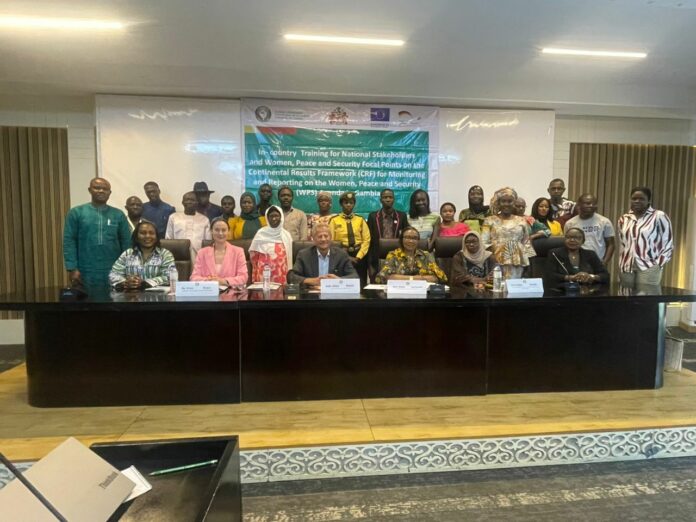By Dawda Baldeh
In its efforts to bolster the Women, Peace, and Security (WPS) agenda, the Economic Community of West African States (ECOWAS) initiated a three-day training program yesterday aimed at enhancing the capacity of key individuals on the Continental Results Framework (CRF) for monitoring and reporting on the WPS agenda in The Gambia.
This event, currently being held at a local hotel in Kololi, is part of broader initiatives under the Support to the ECOWAS Peace and Security Architecture and Operations (EPSAO) project, which is funded by the German Federal Ministry for Economic Cooperation and Development (BMZ) and co-financed by the European Union (EU).
The aim is to strengthen the capabilities of national stakeholders in monitoring and reporting on the Women’s Peace and Security agenda in The Gambia.
Miatta French, the Resident Representative of the ECOWAS Commission to The Gambia, stated: “The Gambia, similar to many nations in our region, has acknowledged the significance of the Women, Peace, and Security agenda in promoting a more inclusive and peaceful society.
“Women have historically been at the forefront of peacebuilding initiatives, yet their voices have often gone unheard, and their contributions have not always been fully appreciated. This is why, in 2013, The Gambia took a significant step by creating its first National Action Plan (NAP) to implement UNSCR 1325,” she added.
She further noted that “after the completion of that plan’s life cycle, a second NAP was established in 2020, reaffirming the country’s dedication to gender equality and women’s involvement in peace and security processes.”
However, she expressed concern that “despite this progress, challenges persist. The Gambia has encountered considerable obstacles in tackling issues such as sexual and gender-based violence (SGBV), which surged during the COVID-19 pandemic.”
“The repercussions of past political turmoil and human rights abuses continue to disproportionately impact women and girls.
“Although women have been vital in peacebuilding and post-conflict reconstruction efforts, they are frequently excluded from formal peace negotiations and decision-making processes,” she explained.
Rugiatou Kah, the Permanent Secretary at the Ministry of Gender who represented the Gender Minister, remarked that The Gambia is among the countries that adopted the United Nations Security Council Resolution 1325 on Women, Peace, and Security.
“In fulfillment of the obligations set by the United Nations in 2012, The Gambia developed and executed its first UNSCR 1325 Action Plan for 2012-2016. This plan emphasizes key actions for the resolution’s implementation.
“This has facilitated the harmonization and domestication of the resolution into the Gender and Women Empowerment Policy 2010-2020, enhancing the participation and representation of women in decision-making processes within governance institutions, as well as in national and international conflict prevention, management, and resolution mechanisms.
“The plan is based on three main pillars: protection, participation, and prevention, known as the 3Ps. The Gambia is currently implementing its second generation UNSCR 1325 National Action Plan on Women, Peace, and Security for 2021-2025.
“This action plan was formulated to build on the achievements made during the implementation of The Gambia’s first Action Plan from 2012 to 2020,” she explained.
Enya Braun, Lead Delegation of the European Union, emphasized that the absence of reliable data has often impeded progress on the WPS agenda.
“At the European Union level, we have witnessed how effective data collection and reporting can significantly influence gender equality and ensure the meaningful involvement of women in peace and security.
“One example is the EU Gender Action Plan (GAP) III (2021-2025), which requires member states to monitor and report on their advancements in promoting gender equality across all sectors, including peace and security.
“Through this monitoring, the EU can identify gaps, share best practices, and refine strategies, ensuring that women’s voices are central to peace initiatives,” she said.
Meanwhile, the German Ambassador to The Gambia, Ambassador Klaus Botzet, also pointed out that “the lack of accurate data remains a considerable challenge, yet it is crucial for prioritizing issues and effectively mobilizing resources. This training is therefore not only timely but also essential.”
He added that “the German federal government is dedicated to promoting just and resilient societies worldwide, including in the West African region, through its feminist development policy.
“This policy aims to dismantle discriminatory structures affecting women, girls, and marginalized groups, concentrating on the three R’s – rights, resources, and representation.”
“These principles align perfectly with the need for assessments, monitoring, and documentation, which are vital to the CRF for the WPS agenda.”




